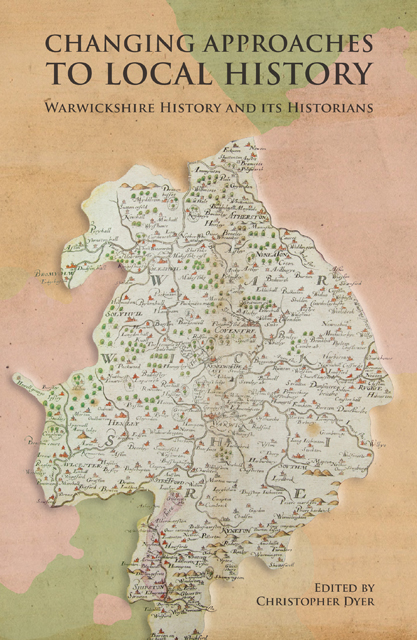Book contents
- Frontmatter
- Contents
- List of Illustrations
- Notes on Contributors
- Foreword
- Acknowledgements
- List of Abbreviations
- Introduction
- 1 The Dugdale Society: Its First Hundred Years
- 2 The Beginnings of Coventry
- 3 Was Commerce in Late Medieval Coventry Restricted by Regulation?
- 4 Studying Late Medieval Small Towns in Warwickshire 1920–2020
- 5 Rural Warwickshire in the Middle Ages: Society and Landscape
- 6 Religion, Rebellion and Red Jackets: Changing Approaches to Society and Politics in Sixteenth-century Warwickshire
- 7 Social Networks, Intellectual Affinities and Communal Harmony in Post-Reformation Warwickshire
- 8 Discovering Warwickshire’s Vernacular Architecture
- 9 Local History and the English Civil War: A View from Warwickshire
- 10 Writing Histories of the Landed Elite in Georgian Warwickshire
- 11 The Victoria County History in Warwickshire
- 12 Writing Women into the Political History of Warwickshire
- 13 Shakespeare and the Warwickshire Landscape in the Age of the Tourist
- Conclusion
- Index
1 - The Dugdale Society: Its First Hundred Years
Published online by Cambridge University Press: 17 December 2022
- Frontmatter
- Contents
- List of Illustrations
- Notes on Contributors
- Foreword
- Acknowledgements
- List of Abbreviations
- Introduction
- 1 The Dugdale Society: Its First Hundred Years
- 2 The Beginnings of Coventry
- 3 Was Commerce in Late Medieval Coventry Restricted by Regulation?
- 4 Studying Late Medieval Small Towns in Warwickshire 1920–2020
- 5 Rural Warwickshire in the Middle Ages: Society and Landscape
- 6 Religion, Rebellion and Red Jackets: Changing Approaches to Society and Politics in Sixteenth-century Warwickshire
- 7 Social Networks, Intellectual Affinities and Communal Harmony in Post-Reformation Warwickshire
- 8 Discovering Warwickshire’s Vernacular Architecture
- 9 Local History and the English Civil War: A View from Warwickshire
- 10 Writing Histories of the Landed Elite in Georgian Warwickshire
- 11 The Victoria County History in Warwickshire
- 12 Writing Women into the Political History of Warwickshire
- 13 Shakespeare and the Warwickshire Landscape in the Age of the Tourist
- Conclusion
- Index
Summary
On 22 January 1920 a meeting was held in the Small Lecture Theatre at the Birmingham and Midland Institute with one item on the agenda: that ‘a Society (to be called the Dugdale Society) should be formed for the publication of manuscript material throwing light on the history, topography and antiquities of the County of Warwick’. Warwickshire was not a pioneer in this sort of venture. Across the country over twenty English counties had established a record-publishing society by 1920, some from well before. Durham and Northumberland had from 1834 been catered for by the Surtees Society, which by 1920 had produced an astonishing 131 volumes, and Warwickshire’s near neighbour, Worcestershire, with a society founded in 1893, had thirty-five volumes to its credit by 1920. In Warwickshire there had been a number of false starts. The first was the Warwickshire Antiquarian Magazine, launched in 1859 under the editorship of John Fetherston of Packwood, a founder member of the Harleian Society, who saw eight issues into print over the next seventeen years, reflecting his interest in the lineages of landed families. By 1872 he had already edited two volumes for the Harleian Society and, as principal contributor to his Magazine, he published sections of the heralds’ 1619 visitation of Warwickshire which appeared later under his editorship as a Harleian Society volume. This was also the year of the final issue of the Magazine, Fetherston dying three years later.
In 1870, a new trend had been set with the establishment of an archaeological section of the Birmingham and Midland Institute. Renamed the Birmingham Archaeological Society in 1898, it had been publishing an annual volume of transactions from 1871. Not surprisingly, given the remit of its sponsoring body, contributions covered not just the city but the counties of Warwickshire, Worcestershire and Staffordshire, on which ‘greater’ Birmingham was beginning to encroach. Its aim was not to publish edited texts of historical source material (though some did appear), but it did set a tone that persisted well into the twentieth century, that Birmingham was the natural focal point for local antiquarian research affecting the midlands. This was reflected in the setting up of a successor to the Magazine, namely the Midland Antiquary, which ran from September 1882 to July 1887, edited by William Fowler Carter of Birmingham.
- Type
- Chapter
- Information
- Publisher: Boydell & BrewerPrint publication year: 2022



